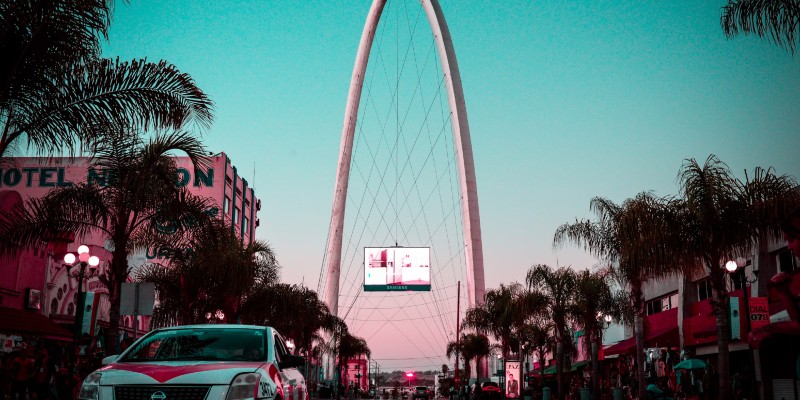Seems things can be fun in Tijuana, Mexico – TJ to the initiated – but things can also go very, very wrong. Of course a popular destination being right on the US-Mexico border, with two million people, a population seriously swelled by sojourning day trippers and US college students looking for adventure plus a few DEA agents and cross-border migrants waiting for their chance to head north. Home to the infamous Tijuana Cartel of course, nobody will be surprised to know Tijuana is a narcotics smuggling centre. The drug wars were known for their super violent turf battles between 2007 and 2010. Homicides peaked in 2010 – when 844 people were killed. In May 2022, it was reported that Tijuana had the highest homicide rate in the world at 138 per 100,000 inhabitants per annum. A seriously deadly statistic to contemplate. So often in Crime and the City we write about crime fiction set in places that are ordinarily perfectly safe and where you could leave your front door open. Not this time. This edition of Crime and the City comes from a city where the balance swings the other way.
Nobody who regularly reads CrimeReads needs to be told that in Raymond Chandler’s The Long Goodbye (1953) Philip Marlowe meets Terry Lennox, a drunk with scars on one side of his face. Then one night Lennox turns up at Marlowe’s place, in trouble and needing a ride to Tijuana. Marlowe agrees as long as Lennox does not tell him any details of why he is running. Of course it gets more complicated. In Laurence Osborne’s Chandler reboot Only to Sleep (2018), a 72-year-old Marlowe opts for retirement down the road from Tijuana in Baja.
By chance it happens that author Mark Rogers lives in Baja California, too, from where he writes the Tijuana Noir anthology series. Rogers’s Tijuana is dark, super dark. It’s hard to work out quite what order they come in, just that they come thick and fast (and all seem to be dated 2022!). TJ99 introduces Rafe, a 99er (apparently a colloquial term for unemployed people in the United States) who, with his Mexican-born wife Paloma, ditches economically struggling Southern California behind and make a new life in Tijuana. All is fine and dandy until he gets sucked into the Tijuana underworld of drug cartels and they come from him and his family. In Mockingbird Josh’s Mexican wife Raquel has vanished prompting a journey through Tijuana’s underbelly of sex trafficking, drugs, murder, and corruption. Other books in the series that are particularly revealing of Tijuana include Black Velvet where a struggling young writer ends up in the vicious dogfighting pits of Tijuana and Iron Star where a Haitian immigrant swaps the chaos of Port-au-Prince for the crime-ridden streets of Tijuana.
A few other Tijuana-set crime novels…
- Leigh K Hunt’s Tijuana Nights (2014) sees McKenna Carmichael miss her flight, watching her plane blow up mid-air, and end up stuck in Mexico. Somehow she’s managed to get on the wrong side of the El Diablo Cartel. A novel is a globe trotting series featuring (and I quote the publicist’s blurb here….) McKenna Carmichael – ‘a reclusive historian turned sexpot’!
- Carl Vonderau’s Saving Myles (2023) features Wade, a respected banker in La Jolla and his estranged wife, Fiona, who have a problem with their son Myles. He’s a drug addict and he’s headed to Tijuana and gotten himself kidnapped. Now Wade and Fiona, with no help from the FBI, must raise the ransom (and perhaps sell their souls) and deal with a Tijuana cartel.
- Kem Nunn’s Tijuana Straits (2004) involves surfer and ex-convict Fahey offering shelter to a young Mexican woman who barely survived an attack on her life. Turns out she’s a labor activist fighting against exploitative foreign factory owners in the Tijuana maquiladoras on the border. The dark side of NAFTA.
Space here for a short plea. Unfortunately the Mexican detective fiction writer Juan Hernandez Luna died tragically young in 2010. He twice won the Dashiell Hammett prize in 1997 and 2007 for the detective novels Tabaco para el Puma (Tobacco for the Puma) and Cadaver de Ciudad (City Corpse). While he has been partially translated his 1998 novel Tijuana Dream remains only available in Spanish. It’s the story of Antonio Zepeda, recently divorced and bored at his job, who takes a trip from Mexico City to Tijuana to unwind. A chance encounter there with a man named Nick starts the beginning of a series of events that will change his life for good. It really should be translated into English.
The Tijuana-born poet and novelist Luis Alberto Urrea has described Luis Humberto Crosthwaite as ‘Tijuana’s greatest literary son’. Crosthwaite, along with fellow Tijuana writing legend Bobby Byrd and his son John William Byrd put together the anthology Puro Border: Dispatches, Snapshots, & Graffiti from La Frontera (2003). Great writing from both sides of the border, plus photographs, corridas, newspaper clips and facts revealing life en la frontera. Mexican contributors include Juan Villoro, Eduardo Antonio Parra, Julian Herbert, Julian Cardona, and David Ojeda. Writers north of the line include Charles Bowden, Luis Urrea, Robert Draper, Cecilia Balli, Gary Nabhan and Doug Peacock.
And finally, as we don’t get to mention him nearly enough in this column, a Joseph Wambaugh classic. Wambaugh of course is best known for his LA set policier novels (he is the son of a Pittsburgh cop and served for 14 years with the LAPD). His writing is characterised by great plots, dark humor and crazy anecdotal incidents to emphasize the psychological peril inherent in modern urban police work. And he’s pretty critical of the police high command in the USA.
His 1984 non-fiction book Lines and Shadows is a fascinating tale of San Diego cops – the Border Crime Task Force – taking on the Tijuana underworld. As Wambaugh wrote – ‘The bandits were no fools. They lived in Tijuana but operated on the American side where it was safe. Tijuana lawmen can be very unpleasant, as the bandits well knew.’ The story moves about, back and forth, across the border and stands, perhaps, as a testament to America’s long running an seemingly never ending – progressing or advancing – war on drugs along the border.
And of course that war defines Tijuana and so much crime writing set in the city.

















